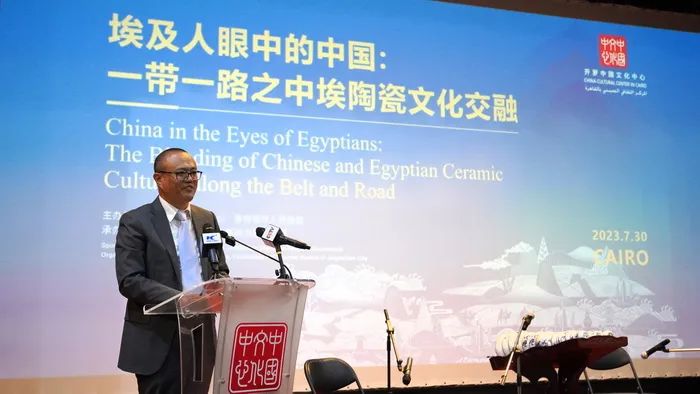Brought together by ceramics, united through ceramics, transcending mountains and rivers, and blending across waves. On July 30th, the lecture "China in the Eyes of Egyptians: The Cultural Fusion of Chinese and Egyptian Ceramics along the Belt and Road Initiative" organized by the Cairo China Cultural Center and the People's Government of Jingdezhen Prefecture Level City was held at the Cairo China Cultural Center. H.E. Mr. Liao Liqiang, the Ambassador of China to Egypt and the Permanent Representative to the League of Arab States attended the lecture and provided guidance. Ms. Hu Xuemei, the Mayor of Jingdezhen City, presided over the lecture and delivered a speech. Mr. Yang Ronghao, Minister-Counselor of the Chinese Embassy in Egypt and Director of the Cairo China Cultural Center delivered a welcome speech.
Around 100 attendees were present at the event, including Mr. Fathi Abdel-Wahab, former Head of the Egyptian Cultural Development Fund and a senior ceramic art expert; Mr. Shao Bin, Deputy Director of the Cairo China Cultural Center; Mr. Lu Pinchang, Vice President of Jingdezhen Ceramic University in China; Dr. Nizar Daher, Art Advisor of the Lebanese Ministry of Culture and President of the Lebanese Artists' Syndicate; Ms. Leila Shili, a Tunisian artist; Mr. Ibrahim Rahman, an Egyptian artist; and members of the Jingdezhen City Government delegation and Egyptian artists.
On behalf of the People's Government of Jingdezhen Prefecture Level City, Ms. Hu Xuemei extended a warm welcome to the guest attendees and expressed heartfelt gratitude to all sectors that have long been concerned about and supported the development of Jingdezhen City. Ms. Hu stated that Jingdezhen has always been an open and inclusive city. Jingdezhen ceramics represent not only Chinese culture but also a global language. The fusion of Chinese and Egyptian cultures 800 years ago resulted in the creation of the iconic blue and white porcelain of the Yuan Dynasty, which has gained worldwide renown. The camel bells along the ancient Silk Road have witnessed over 2,000 years of mutual understanding and interaction between China and Arab countries. From the opening of the Silk Road to the joint construction of the Belt and Road Initiative, the exchanges between Chinese and Arab civilizations have spanned a millennium, fostering a history of mutual learning and appreciation. Standing at a new historical starting point, Jingdezhen City sincerely hopes that both sides will work hand in hand to promote the spirit of the Silk Road, deepen cultural exchanges, enhance economic and trade cooperation, jointly unfold the infinite brilliance of ceramic culture, and compose a harmonious and prosperous chapter of Sino-Arab friendship. Internationalization is the most distinctive feature of Jingdezhen as a city. Jingdezhen has always upheld an international perspective, vigorously promoted cultural exchange and mutual learning, and is striving to build new platforms for international cultural exchanges.
Subsequently, Ms. Hu Xuemei delivered a detailed introduction to Jingdezhen's cultural heritage and unique charm in English. As the event approached its conclusion, she earnestly invited attendees and people from all walks of life to visit Jingdezhen in October this year in the golden season of autumn to participate in the 2023 China Jingdezhen International Ceramic Culture Expo. This visit would offer a firsthand experience of the city's cultural heritage and developmental vitality, and create a brighter future for Sino-Arab friendship.
Mr. Yang Ronghao pointed out that porcelain is the most important cultural symbol of Chinese civilization, and Jingdezhen is known as the world's porcelain capital, holding a significant place in the history of global ceramics. For Egypt, the discovery of ancient Chinese ceramic fragments in the ruins of Fustat proves the long-standing history of friendly ceramic exchanges between China and Egypt, reflecting the enduring friendship between the two countries.
During the exchange activities, Mr. Lu Pinchang, Vice President of Jingdezhen Ceramic University, Mr. Weng Yanjun, Director of the Jingdezhen Imperial Kiln Institute, and Mr. Fathi Abdel-Wahab, a senior ceramic art expert, engaged in friendly dialogues centered around the Belt and Road Initiative, utilizing ceramics as a medium. They deeply explained the development of cultural integration, effectively promoting mutual understanding between China and Egypt.
Jingdezhen City is renowned because of ceramics and thrives through ceramics. It is one of China's historical and cultural cities and the capital of global handicrafts and folk arts. Here, the kiln fire has continued for a millennium, and craftsmanship constantly renews itself. In the process of revitalizing the historical and cultural heritage of ceramics, Jingdezhen is once again writing a brilliant chapter in the history of the global porcelain capital. During the event, a promotional video about Jingdezhen City was shown, providing a comprehensive understanding of Jingdezhen's past and present, leaving a profound impression on the audience. The splendid ceramic music performances by the Jingdezhen Ceramic Orchestra, featuring pieces such as "Blue and White Porcelain," "Jasmine Flower," "Songs by the Nile," and "Waiting for You in Jingdezhen," showcased the unique "resonant" characteristic of Jingdezhen ceramics, witnessing the perfect integration of ceramic artifacts and musical art.
The lecture "China in the Eyes of Egyptians: The Cultural Fusion of Chinese and Egyptian Ceramics along the Belt and Road Initiative" is an important activity for the Jingdezhen City Government delegation's cultural and trade exchanges with Arab countries.
